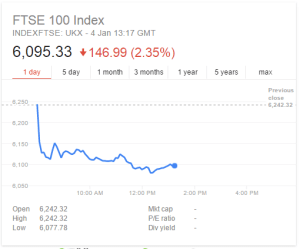Is the Chinese government attempting to acquire British companies cheaply by intentionally crashing stock prices on FTSE? London venue down £40 billion on first day of trading for 2016
Hysteria is once again emerging as London’s Financial Times Stock Exchange (FTSE) began the new year today with a collective £40 billion having been wiped off stocks which are publicly listed on London’s benchmark venue. Whilst Britain’s economic situation had improved during the course of 2015, led solely by London’s booming financial markets sector (the […]

Hysteria is once again emerging as London’s Financial Times Stock Exchange (FTSE) began the new year today with a collective £40 billion having been wiped off stocks which are publicly listed on London’s benchmark venue.
Whilst Britain’s economic situation had improved during the course of 2015, led solely by London’s booming financial markets sector (the rest of the country is still pretty much as it was before – de-industrialized, deep in debt and bearing no relation to the economic powerhouse of Central London), the listings on the FTSE, largely European stocks, dropped with the velocity of a falling iron girder as China’s stock market dipped in value by 7%.
Armchair pundits have been quick to present their perspectives on this matter, with many mainstream news sources having simply stated that factors in China and the Middle East are affecting European stocks.
Those market analysts who are simply copying and pasting from Bloomberg Terminal are missing the real source of such grave devaluations in stocks listed on the FTSE.
Unlike in free market economies, China’s publicly listed companies whose stock is available on Chinese exchanges are subject to 50% mimimum ownership by the Chinese government, and the stock exchanges themselves are subject to substantial government ownership, and complete government regulation and operational guidelines in line with the Communist Party of China’s State Council’s conditions.
Quite simply, the difference between publicly traded stock of companies in free market economies compared to that of Chinese companies listed on Chinese venues is that in the free market, real economic, industrial and commercial factors dictate the price of the stock, whereas in China, the government effectively is the ‘company’ that owns controlling stakes in most listed firms, as well as the venues themselves.
China’s government has vast buying power as a result of the profits that it generates from its ownership in Chinese companies, most of which are vast corporations which export to the entire world, and has a will to expand its economic empire.
What could be easier than influencing the prices of Chinese stocks that relate to companies doing business overseas, in order to affect the prices of the stock of firms listed on free market venues that are dependent on specific Chinese suppliers or customers?
Rather than looking at this on a macro level, it is perhaps prudent to view this whole circumstance as a major mergers and acquisitions campaign by China. The government can simply influence the prices of stocks on the FTSE by artificially devaluing stock on its own exchanges, then wait for the prices of FTSE-listed European firms to fall, then acquire major steaks at cheap prices in firms on the FTSE via purchasing stock on the public market via the normal channel, through state-owned or semi-state owned Chinese firms.

The collapse is absolutely huge this time. By just after 12.00pm London time today, £40 billion had vanished from the value of Britain’s leading companies which is HALF of the amount that fell from the value in the entirety of 2015.
One of the main reasons that Chinese investors favor FX which is conducted via introducing brokers and fund managers in China and placed with British, Australian or European FX brokerages is because Chinese investors often do not want to invest in Chinese stocks for this very reason.
FinanceFeeds has conducted extensive research on this matter across a number of cities in China and the astute investors which have property portfolios and other illiquid, physical assets like to retain property, farming and technology investments and then leverage the profits from these long term investments to trade FX via managed portfolios so that they can get a real outcome in liquid markets rather than have their investments used as a pawn on the Chinese government’s chess board. The property and other large-scale physical investments then serve as long-term collateral.
It is not uncommon, for example, for a Western company to issue an intention to list its stock pre-IPO to a Chinese audience and then invite Chinese investors to a pre-IPO auction at a fixed price. This is far more preferable in China to investing in existing stocks because the investors themselves want to be able to influence the values of their investments.
With the banning of bank transfers by FX traders to overseas entities this year, and the mandatory use of government-owned merchant services company UnionPay, it is clear that China wants to be able to see where these funds are going and who is investing in what.
One particular company that was affected by today’s FTSE downturn is AngloAmerican PLC which experienced a 17.12 point decrease in value, 5.72% down from last week’s close. I would venture to suggest that China would not object to a partial ownership of that particular firm at a reasonable price.
Commodities such as copper have been affected also, with a 3% drop in value having taken UK-listed mining companies into the red. Bearing in mind China’s massive requirement for raw materials for manufacturing and construction, and the nation’s export dominance, ownership of UK mining companies would perhaps also be attractive to China’s partially or wholly state owned giants.
The Chinese government is very shrewd and China as a whole country knows the business world very well indeed, such a sophisticated nation it has become, with such a supremely intelligent population, therefore thinking of the whole country as a comradeship of unified business acumen held together by the vault-like, cash rich fabric of the one-for-all and all-for-one Chinese government is perhaps worth bearing in mind when viewing situations of this magnitude.
Photograph Copyright Andrew Saks-McLeod









